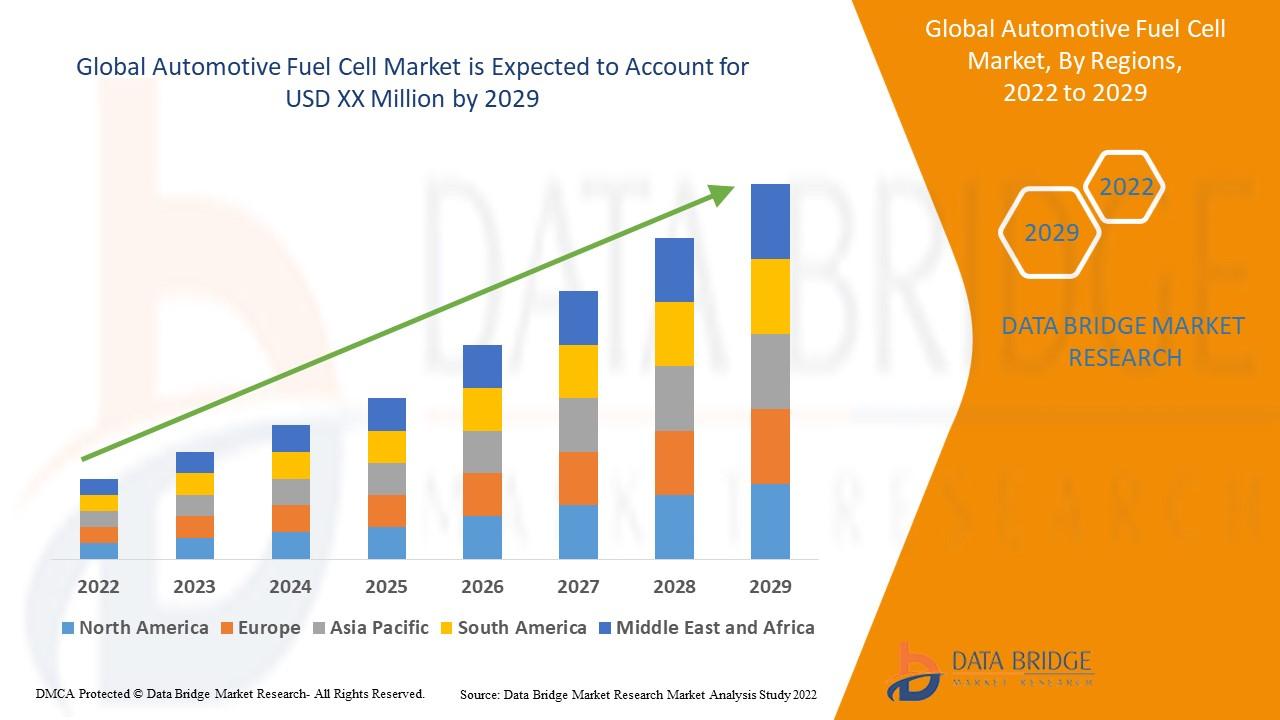Automotive Fuel Cell Market Value with Status and Analysis 2029

"Executive Summary Automotive Fuel Cell Market: Share, Size & Strategic Insights
CAGR Value
The automotive fuel cell market is expected to witness market growth at a rate of 53.72% in the forecast period of 2022 to 2029.
For an excellent outcome of Automotive Fuel Cell Market report, qualitative and transparent research studies are carried out devotedly for the specific niche. Being a global market research report, it also identifies, analyses, and estimates the emerging trends along with major drivers, challenges and opportunities in the Automotive Fuel Cell Market industry along with analysis of vendors, geographical regions, types, and applications. An idea about competitive landscape plays very important role in deciding about the improvements required in the product and more. As businesses can achieve thorough insights with this report, they can confidently take decisions about their production and marketing strategies.
This global Automotive Fuel Cell Market report also estimates the market status, market share, growth rate, future trends, market drivers, opportunities and challenges, risks and entry barriers, sales channels, distributors and Porter's Five Forces Analysis. It has happened to be the requisite of this rapidly changing market place to take up such market report which makes aware about the market environment. Analysis and estimation of important industry trends, market size, and market share are mentioned in the Automotive Fuel Cell Market report. The market research performed here also provides information about manufacturers, market competition, cost, market effect factors for the forecast period.
Equip yourself with actionable insights and trends from our complete Automotive Fuel Cell Market analysis. Download now:
https://www.databridgemarketresearch.com/reports/global-automotive-fuel-cell-market
Automotive Fuel Cell Industry Statistics Overview
**Segments**
- **By Application**
- Passenger Cars
- Commercial Vehicles
- Two-Wheelers
- **By Type**
- Proton Exchange Membrane Fuel Cell (PEMFC)
- Phosphoric Acid Fuel Cell (PAFC)
- Solid Oxide Fuel Cell (SOFC)
- **By Component**
- Fuel Stack
- Fuel Processor
- Power Conditioner
- Air Compressor
- Humidifier
The global automotive fuel cell market is segmented based on application, type, and components. In terms of application, the market is categorized into passenger cars, commercial vehicles, and two-wheelers. Passenger cars are expected to dominate the market due to the increasing demand for eco-friendly vehicles and government initiatives to promote fuel cell vehicles. Commercial vehicles segment is also anticipated to witness significant growth owing to the rising adoption of electric buses and trucks for sustainable transportation solutions. Two-wheelers are emerging as a potential market for automotive fuel cells, especially in countries with a high population density and traffic congestion issues.
Based on type, the market is segmented into proton exchange membrane fuel cell (PEMFC), phosphoric acid fuel cell (PAFC), and solid oxide fuel cell (SOFC). Among these, PEMFCs are widely used in automotive applications due to their high efficiency, low operating temperature, and quick start-up time. PAFCs are suitable for stationary power generation applications, while SOFCs are more commonly used in auxiliary power units for commercial vehicles and trucks.
The market is further segmented by components including fuel stack, fuel processor, power conditioner, air compressor, and humidifier. The fuel stack segment is expected to hold a significant market share as it is the core component of a fuel cell system responsible for electricity generation through the chemical reaction of hydrogen and oxygen. Fuel processors are essential for converting hydrogen-rich fuels such as methanol into hydrogen for the fuel cell stack. Power conditioners help regulate the voltage and current output of the fuel cell system, while compressors and humidifiers ensure the efficient operation of the fuel cell by providing the required air and humidity levels.
**Market Players**
- Ballard Power Systems
- Panasonic Corporation
- Plug Power Inc.
- Hydrogenics
- Ceres Power Holdings plc
- Toyota Motor Corporation
- Honda Motor Co., Ltd.
- Hyundai Motor Company
- Daimler AG
- BMW AG
Key market players in the global automotive fuel cell market include Ballard Power Systems, Panasonic Corporation, Plug Power Inc., Hydrogenics, Ceres Power Holdings plc, Toyota Motor Corporation, Honda Motor Co., Ltd., Hyundai Motor Company, Daimler AG, and BMW AG. These companies are actively involved in research and development initiatives to enhance the efficiency and performance of automotive fuel cell systems. Partnerships, collaborations, and strategic alliances are common strategies adopted by these players to expand their market presence and develop innovative fuel cell technologies for the automotive industry.
The global automotive fuel cell market is poised for significant growth in the coming years, driven by the increasing focus on sustainable transportation solutions and stringent regulations to reduce carbon emissions. One key trend shaping the market is the shift towards hydrogen fuel cell technology as a clean alternative to traditional internal combustion engines. Automakers and governments worldwide are increasingly investing in fuel cell technology to address environmental concerns and meet sustainability targets. This trend is expected to drive the demand for automotive fuel cells across various applications, including passenger cars, commercial vehicles, and two-wheelers.
In terms of application, passenger cars are expected to lead the market growth as consumer preferences shift towards eco-friendly vehicles with lower emissions. Government incentives and policies that promote the adoption of fuel cell vehicles are also contributing to the growth of this segment. Commercial vehicles, including electric buses and trucks, are also expected to witness significant demand for fuel cell technology, especially in urban areas where reducing air pollution is a priority. Two-wheelers, particularly in densely populated regions with traffic congestion issues, present a unique opportunity for automotive fuel cells to penetrate the market further.
Within the automotive fuel cell market, different types of fuel cells cater to varying needs and applications. Proton exchange membrane fuel cells (PEMFC) are popular for automotive use due to their efficiency and quick start-up time, making them suitable for vehicles that require instant power availability. Phosphoric acid fuel cells (PAFC) find application in stationary power generation, while solid oxide fuel cells (SOFC) are commonly used in auxiliary power units for commercial vehicles. Each type of fuel cell offers specific advantages and is tailored to meet the requirements of different automotive applications, contributing to the overall diversity and growth of the market.
The components of automotive fuel cell systems play a crucial role in their efficiency and performance. The fuel stack, as the heart of the fuel cell system, converts hydrogen and oxygen into electricity, making it a key component in power generation. Fuel processors are vital for converting hydrogen-rich fuels into usable hydrogen for the stack, ensuring a steady supply of fuel. Power conditioners regulate the output of the fuel cell system, while air compressors and humidifiers maintain optimal operating conditions for efficient performance. All these components work together to ensure the seamless operation of automotive fuel cell systems, highlighting the importance of a well-integrated approach to system design and functionality.
Key market players in the global automotive fuel cell market are actively engaged in R&D efforts to enhance the performance and reliability of fuel cell systems. Collaborations and partnerships are common strategies among industry players to leverage expertise and resources for developing innovative technologies and expanding market reach. As the automotive industry continues to embrace sustainable mobility solutions, the demand for fuel cell technology is expected to grow, opening up new opportunities for market players to capitalize on the shift towards cleaner and greener transportation options.The global automotive fuel cell market is poised for significant growth in the coming years as the focus on sustainable transportation solutions intensifies, driven by stringent regulations to reduce carbon emissions. One key trend shaping the market is the increasing adoption of hydrogen fuel cell technology as a clean alternative to traditional internal combustion engines. This shift is driven by automakers and governments worldwide investing in fuel cell technology to address environmental concerns and meet sustainability targets. The market is witnessing a transition towards eco-friendly vehicles, with passenger cars expected to dominate the market growth due to consumer preferences for lower emission vehicles and government incentives promoting fuel cell vehicle adoption.
Commercial vehicles, including electric buses and trucks, are also expected to experience significant demand for fuel cell technology, especially in urban areas with a focus on reducing air pollution. Two-wheelers, particularly in densely populated regions facing traffic congestion issues, present a unique opportunity for automotive fuel cells to further penetrate the market. The adoption of different types of fuel cells tailored to meet various automotive applications is contributing to the diversity and growth of the market. Proton exchange membrane fuel cells (PEMFC) are favored for automotive applications for their efficiency and quick start-up time, while phosphoric acid fuel cells (PAFC) and solid oxide fuel cells (SOFC) serve specific purposes in stationary power generation and auxiliary power units for commercial vehicles, respectively.
The components of automotive fuel cell systems play a vital role in ensuring efficiency and performance. The fuel stack, essential for electricity generation through the chemical reaction of hydrogen and oxygen, serves as the core component of a fuel cell system. Fuel processors are crucial for converting hydrogen-rich fuels into usable hydrogen for the stack, enabling a steady fuel supply. Power conditioners regulate the voltage and current output of the fuel cell system, while air compressors and humidifiers maintain optimal operating conditions for efficient performance. The seamless interaction of these components highlights the significance of a well-integrated approach to system design and functionality in automotive fuel cells.
Key market players such as Ballard Power Systems, Panasonic Corporation, and Toyota Motor Corporation are actively involved in research and development initiatives to enhance the efficiency and performance of automotive fuel cell systems. Collaborations, partnerships, and strategic alliances among industry players are common strategies to expand market presence, develop innovative technologies, and capitalize on the growing demand for cleaner transportation options. As the automotive industry continues to embrace sustainable mobility solutions, the global automotive fuel cell market is expected to witness substantial growth, opening up new avenues for market players to leverage the shift towards eco-friendly and efficient transportation solutions.
Understand how much market the company controls
https://www.databridgemarketresearch.com/reports/global-automotive-fuel-cell-market/companies
Alternative Market Research Questions for Automotive Fuel Cell Sector Reports
- What is the estimated size of the Automotive Fuel Cell Market globally?
- How is the growth rate of the Automotive Fuel Cell Market benchmarked?
- What segment-level details are provided in the Automotive Fuel Cell Market report?
- Which firms are shaping the competitive environment for Automotive Fuel Cell Market?
- What geographic and economic regions are highlighted for Automotive Fuel Cell Market ?
- Who are the most influential Automotive Fuel Cell Market participants?
Browse More Reports:
Global Nail Psoriasis Treatment Market
Global Natural Language Processing NLP Healthcare Life Sciences Market
Global Network Function Virtualization Market
Global Neurofibromatosis Type 1 Market
Global Neuro-Stimulators Market
Global Neurosurgical Drills Market
Global Non-mydriatic Handheld Fundus Camera Market
Global Non-Ultraviolet (UV) Dicing Tape Market
Global Nucleating and Clarifying Agents Market
Global Nutrigenomics Testing Market
Global Obliterative Bronchiolitis Market
Global Off Highway Diesel Common Rail Injection System Market
Global Oil Extraction Equipment Market
Global Oil Field Communications Market
Global Oleo Chemicals Market
About Data Bridge Market Research:
An absolute way to forecast what the future holds is to comprehend the trend today!
Data Bridge Market Research set forth itself as an unconventional and neoteric market research and consulting firm with an unparalleled level of resilience and integrated approaches. We are determined to unearth the best market opportunities and foster efficient information for your business to thrive in the market. Data Bridge endeavors to provide appropriate solutions to the complex business challenges and initiates an effortless decision-making process. Data Bridge is an aftermath of sheer wisdom and experience which was formulated and framed in the year 2015 in Pune.
Contact Us:
Data Bridge Market Research
US: +1 614 591 3140
UK: +44 845 154 9652
APAC : +653 1251 975
Email:- [email protected]
"


